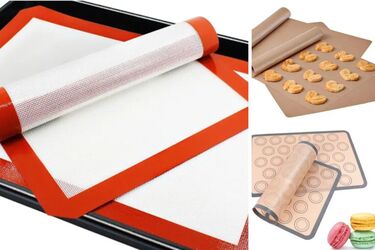Which baking mat is right for you: the options

Why do I use baking mats?
- for baking (muffins, dough)
- for rolling out dough
- for freezing products
- for drying and stabilizing marmalade, marshmallows
- for isomalt, chocolate.
As you can see, it is an indispensable assistant?
What kind of mats do I use?
- silicone reinforced (i.e., stitched with a fibrin thread inside) or silicone without thread - for biscuits, yeast dough, pasta, cupcakes, marmalade stabilization
- perforated silicone (fine mesh) - for shortcrust pastry (cookies, crispy bases for mousse cakes, tarts) - for choux pastry (profiteroles, eclairs) - for puff pastry
- Teflon - for pasta - for biscuits - for yeast baking
- Silicone with low sides - mainly for sponge cakes (such as Japanese)
What is the difference?
All of these mats:- withstand low and high temperatures (from -40 to +300 C)- do not require additional lubrication- evenly distribute the temperature over the surface, which allows the baked goods to bake evenly- serve to prevent products from sticking to the surface- are easy to clean and storeOf the silicone mats, I still recommend stopping at the one stitched with a thread (reinforced), as it is more durable and thanks to the thread, it warms up more evenly inside.
I also recommend buying a perforated one. It serves perfectly for a certain type of dough, allows air circulation, so desserts are baked better and more evenly. Teflon is now my favorite for pasta.

